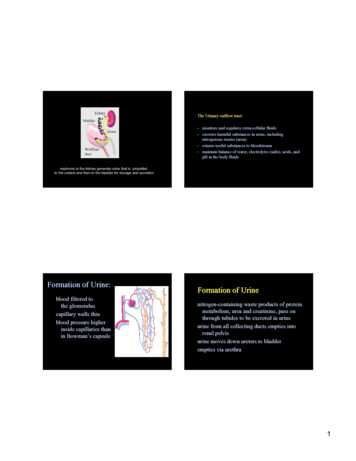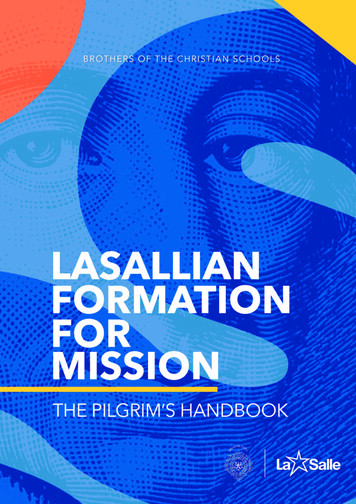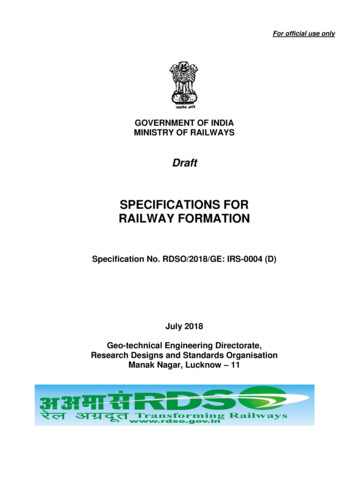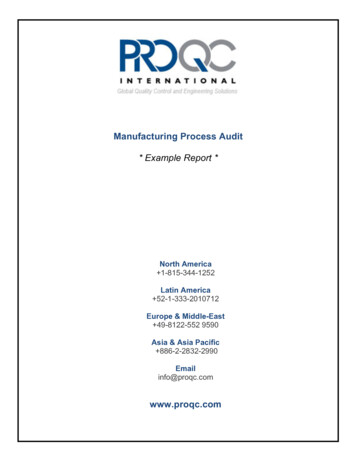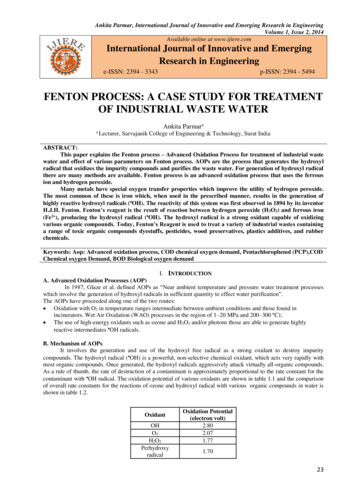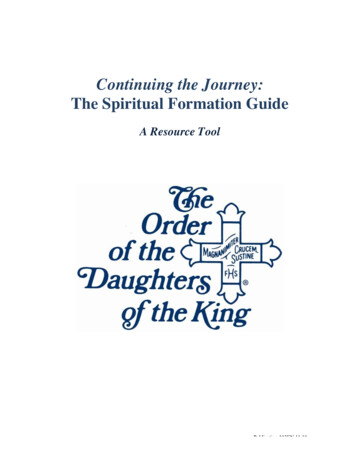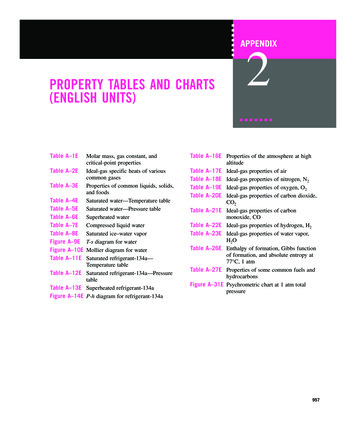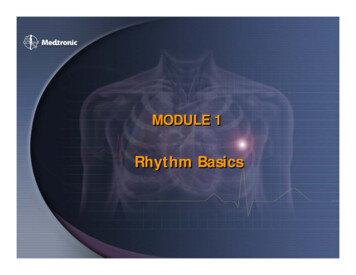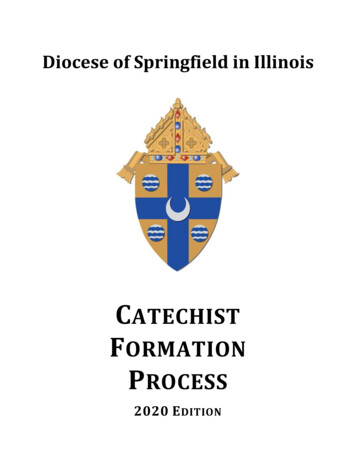
Transcription
Diocese of Springfield in IllinoisCATECHISTFORMATIONPROCESS2020 E DITION
TABLE OF CONTENTSTable of Contents . 2Introduction . 4Tasks of Catechesis . 4The Importance of Ongoing Formation . 5Diocesan Policies . 5Certification Procedure . 6Levels of Formation. 7Catechist Formation Records . 8Guidelines for Courses . 10Curriculum. 10Human, Spiritual, Intellectual and Apostolic Qualities . 12Planning Local Courses for Catechist Formation . 14Approved Courses . 15University of Dayton’s Institute for Pastoral Initiatives. 15Echoes of Faith . 15Franciscan at Home Catechist Track . 15Certification from Other Dioceses . 15Lay Ministry Formation . 16College Courses . 16Webinars . 16Book Study . 16Professional Educator License . 16Protecting God’s Children . 16Other Programs. 17Appendix . 18CATECHIST FORMATION PROCESS — PERMANENT RECORD CARD . 19Application for Course Approval . 21Sample Completion Certificate . 22Application for Certificate . 23Summary of Participation in a Live or Recorded Webinar . 24Application for Book Study Approval . 25The ministries of the Office for Catholic Education are funded in part by the generous contributions to theAnnual Catholic Services Appeal of the Diocese of Springfield in Illinois.2
Office for Catholic EducationDiocese of Springfield in Illinois1615 West Washington StreetSpringfield, Illinois 62702-4757(217) ar Parish Catechetical Leaders,In the Fourth Diocesan Synod which concluded in 2017, Bishop Paprocki promulgated a new missionstatement for the Diocese of Springfield in Illinois. One of the points in the mission statement includes arenewed emphasis on formation. Our Hearts Were Burning Within Us, published by the United StatesConference of Catholic Bishops, challenges us to “grow in discipleship throughout life” and that “all believersneed and are called to build vibrant parish and diocesan communities of faith and service.” Parish anddiocesan communities “cannot exist without a strong, complete, and systematic catechesis for all itsmembers” (p. 2, emphasis added).Additionally, the Fourth Diocesan Synod in paragraph 59, section A states:The faithful of all ages are urged throughout their lives to study the Bible in light of the Catholic faith,to learn the teachings of the Catholic faith through ongoing formation and education, and fosterthose means which the Church uses to make the faith known and fervently practiced, e.g., Catholicmedia, lay retreats for men and women, confession of sins in the Sacrament of Penance, andfrequent visits to Our Lord in the Blessed Sacrament, whether exposed for adoration or reserved inthe tabernacle.My challenge as the Director for Catechesis in the Office for Catholic Education for the Diocese of Springfieldin Illinois is to be a resource for catechists and other leaders in faith formation to achieve this vision from ourbishops of a strong, complete and systematic catechesis in our Church today as emphasized by BishopPaprocki in the synod statue noted above. This revised handbook for the Catechist Formation Process is onetool in this effort.This handbook builds on previous editions, the most recent edition being edited by Ms. Kim Diaz from St.Thomas the Apostle parish in Decatur. I am grateful to Kim’s work and those who came before her as a greatcloud of witnesses in faith to develop this resource (cf. Hebrews 12:1).Sincerely in Christ,Kyle HoltgraveDirector for CatechesisDiocese of Springfield in Illinois3
INTRODUCTIONLike all Christians, catechists are called to continual conversation and growth in their faith and, for this reason, arecalled to ongoing spiritual formation. The catechist should continue his or her spiritual formation through frequentreception of the sacraments, especially the Holy Eucharist and Reconciliation, through spiritual direction, andthrough continued study of the faith. The catechist should also be provided with opportunities for spiritual growthsuch as retreats, conferences, etc. In addition to spiritual formation, the catechist is also in need of pedagogicalformation, especially as society, teaching methods, and culture change.National Directory for Catechesis, no. 55-C, United States Conference of Catholic BishopsThe Catechist Formation Process of the Diocese of Springfield in Illinois is a religious studies andChristian experience process for all catechists in the diocese. The process is offered andadministered by the Office for Catholic Education, and its goal is to provide opportunities forcatechists to enrich their love and knowledge of the Catholic faith in order to be more effectivecommunicators of the Gospel to those whom they are called to minister.To achieve this goal, parish catechetical leaders are charged with the responsibility to train andfurther enrich the catechists in their parish programs on the local level, whether they arecatechists of parish schools of religion, Catholic schools, or other programs of formation (NDCno. 54-B-5). This guide is a resource for parish catechetical leaders to be successful in theirmission to further train and enrich catechists in their parish catechetical programs.Tasks of CatechesisJesus formed his disciples by making known to them the various dimensions of the Kingdom of God. Thefoundational task of catechesis is to achieve this same objective: the formation of disciples of Jesus Christ.National Directory for Catechesis, no. 20, United States Conference of Catholic BishopsWhat are we training our catechists to do? According to the National Directory for Catechesis,catechists are charged with six fundamental tasks, each of which is related to an aspect of faithin Christ. All efforts in evangelization and catechesis should incorporate these tasks.Catechesis 1. Promotes knowledge of the faith2. Promotes a knowledge of the meaning of the Liturgy and the sacraments3. Promotes moral formation in Jesus Christ4. Teaches the Christian how to pray with Christ5. Prepares the Christian to live in community and to participate actively in the life andmission of the Church6. Promotes a missionary spirit that prepares the faithful to be present as Christians insocietyNational Directory for Catechesis, no. 20, United States Conference of Catholic Bishops4
The Importance of Ongoing FormationSince effective catechesis depends on virtuous and skilled catechists, their ongoing formation should enhance thehuman, spiritual, and apostolic qualities and catechetical skills they bring to their ministry.National Directory for Catechesis no. 55-E, United States Conference of Catholic BishopsThe catechist must be an informed adult Catholic. They must have a genuine Christiancommitment to Jesus Christ and the ability by word and manner to share with others themystery of Christ. Parish catechetical leaders assist their catechists with ongoing formationthrough the following objectives:1. To instruct catechists who are new in parish catechetical programs and Catholic schoolsin a basic overview of the ministry of catechesis.2. To engage all catechists and program administrators in ongoing formation to deepentheir understanding of the teachings of the Catholic Church through courses, workshopsand institutes provided by the parish catechetical leader and/or the Office for CatholicEducation.3. To provide catechists with periodic gatherings for spiritual enrichment in the local parishsuch as staff retreats, days of prayer, group studies and other experiences of sharingand community building.The diocesan Office for Catholic Education provides opportunities and resources to help parishcatechetical leaders achieve these objectives.Diocesan PoliciesThe formation guidelines noted above are the foundation for diocesan policies. All catechists, whether they teach in a school or parish catechetical program, mustactively seek formation through the diocesan Catechist Formation Process (Bk3§504.6).All catechists, teachers and aides shall complete and maintain the advanced level of thediocesan Catechist Formation Process (Bk3§302.6).Furthermore, all catechists are bound by the Policy on Working with Minors and the Policy onSexual Abuse of Minors by Church Personnel and must complete the training and screeningrequirements of these policies prior to being a catechist or teacher (Bk3§408.1).These policies are promulgated in Book 3: The Teaching Office of the Church of the diocesanpolicies and procedures. Youth protection policies are in Book 2: The People of God. This bookand other diocesan policies can be found on the diocesan website atwww.dio.org/policy/home.html.5
CERTIFICATION PROCEDUREParticipation in the Catechist Formation Process is meant to enrich catechists through aprogram of well-rounded formation opportunities that attend to the human, spiritual,intellectual and apostolic qualities needed to be effective catechists. Therefore, catechists mustparticipate in formation opportunities that reflect a diversity of topics and experiences.As participants in the Catechist Formation Process proceed through formation opportunities,recognition is given based on completing a certain number of hours in a variety of areas. Theselevels, identified as Basic, Intermediate and Advanced, mark milestones of achievement forrecognition purposes.Once a catechist has reached the Advanced Level, certification must be renewed every threeyears.If a catechist has a college degree in theology or related field, he or she may apply for theDegreed Level certification which satisfies all the requirements through Advanced Level notedhere.Coursework for each of the formation levels consists of a diversified curriculum of study alongwith participation in personal spiritual enrichment. Each level also includes elective hours socatechists can pursue specific topics of interest that are approved for credit, or to documenthours above and beyond the minimum needed in a particular area of study.Electives for each level could include local formation programs or diocesan workshops that donot otherwise fulfill a more specific course area in this handbook. Attendance at nationalconferences such as ones sponsored by organizations like the National Conference forCatechetical Leadership, National Conference on Catholic Youth Ministry or National CatholicEducation Association conferences are also eligible for elective credit if themes at theseconferences do not meet the course criteria for credit. And if a catechist has met the number ofhours required in a specific area of study, subsequent hours in that same area can be scored aselective credit.Personal Spiritual Enrichment could include retreats such as Pre-Cana or Marriage Encounter,Cursillo, Teens Encounter Christ, Koinonia, or serving as a sponsor for RCIA. Parish missions anddays of recollection offered through Catholic institutions may apply as Personal SpiritualEnrichment as well. Programs for personal spiritual enrichment should be experiences that areabove and beyond the normal routine of a faithful Catholic.Once a level of formation is achieved, the parish catechetical leader submits an Application forCertificate along with documentation to the Office for Catholic Education. The application formis included in the Appendix of this handbook.6
Levels of FormationEach level noted here marks a milestone in ongoing formation achievement. These levels arerecognized with a certificate presented to the catechists and special publicity in the diocese onCatechetical Sunday. Parish catechetical leaders can include these levels as part of thecredentials the catechists have in their parish or institution’s program. Other local recognition isencouraged as well.Basic Level (90 hours)TopicCreditOverview of Catholic Doctrine .10 hoursIntroduction to Sacred Scripture .10 hoursSacraments in General .10 hoursIntroduction to Morality .10 hoursBasic Methods I .5 hoursBasic Methods II .5 hoursElective .10 hoursPersonal Spiritual Enrichment .30 hoursIntermediate Level (90 hours)TopicCreditChristology .10 hoursThe Gospels .10 hoursDiscipleship and Spirituality .10 hoursCatholic Social Teaching or Modern Moral Issues .10 hoursIntermediate Methods I .5 hoursIntermediate Methods II .5 hoursElective .10 hoursPersonal Spiritual Enrichment .30 hoursAdvanced Level (80 hours)TopicCreditSacraments in Depth .10 hoursSurvey of Church History or Vatican Council II .10 hoursThemes in Scripture .10 hoursElective .20 hoursPersonal Spiritual Enrichment .30 hours7
Renewal Level (30 hours)The Advanced Level certificate is valid for three years and can be renewed by acquiring 30hours of credit in any approved program of study within that three-year period. Certificaterenewals are requested using the Application for Certificate that is included in the Appendix ofthis handbook. Programs of study can include those listed in this handbook or other programsapproved by the Office for Catholic Education.Degreed LevelThe Degreed Level of recognition is given for catechists who have a college degree, bachelors orhigher, from an approved institution in theology, religious studies or a related field. Thepurpose of this recognition is to acknowledge ongoing formation by catechists who pursuedtheir formation through formal college coursework. The Degreed Level does not expire but thecatechist is expected to continue his or her formation. This ongoing formation can beaccomplished by attending one theological or pastoral ministry conference or course annually.Catechist Formation RecordsAccurate record keeping of one’s formation progress is essential. Catechists and ParishCatechetical Leaders should work collaboratively to ensure information is accurate andrecorded in a timely manner.Catechists1. The primary responsibility for record keeping belongs to the individual catechist.2. Catechists should receive a completion certificate at the conclusion of a formation programthat includes information about the content of the course, date and location of the training,and how many hours of instruction the course has been approved for by the Office forCatholic Education.3. Copies of all completion certificates should be turned in to the Parish Catechetical Leaderwhen courses are completed as needed.4. Catechists should retain the original completion certificate.Parish Catechetical Leaders1. Parish Catechetical Leaders keep an ongoing record for all catechist formation in the parishusing a Permanent Record Card for each catechist, archiving past catechists with the Officefor Catholic Education as needed.2. As catechists participate in formation programs, records of attendance are collected andturned in to the parish catechetical leader as needed, with catechists keeping a copy of theirattendance records in case information gets lost.8
3. Parish catechetical leaders record hours on individual Permanent Record Cards and retainrecords of attendance with each permanent record card for audit purposes duringeducational reviews.4. Credit can be applied to any level of the Catechist Formation Process based on theinformation on the completion certificate, noting, however, that level of completioncertificates must be awarded in sequence.5. If a specific level of certification is achieved by meeting the minimum hours for each area ofinstruction within that level and lower levels are complete, the parish catechetical leadersubmits a copy of the catechist’s permanent record card and completion certificates asdocumentation showing the completed level along with an Application for Certificate asneeded to the Office for Catholic Education for catechist recognition.Office for Catholic Education1. The Office for Catholic Education verifies completion of a level of formation and awardscertificates.2. Awardees are recognized annually on Catechetical Sunday.3. The director will also conduct periodic reviews of parish formation programs to assessprogress in the Catechist Formation Process.4. The Office for Catholic Education also maintains an archive of Permanent Record Cards forcatechists who are no longer active so that formation progress can be retained should thecatechist return to ministry.9
GUIDELINES FOR COURSESCurriculumThe following section describes the criteria for each theology or methodology topic noted in thevarious levels of formation. This information is provided as a guide for parish leaders who wishto create their own courses to meet local needs in the Catechist Formation Process. All coursesmust be registered with the Office for Catholic Education using the Application for CourseApproval found in the Appendix to receive this credit. Approved courses that do not fit into oneof these categories can be used for elective credit. A partial list of approved courses is availablein the next section of this handbook. For a complete list, contact the Office for CatholicEducation.Basic LevelOverview of Catholic DoctrineCourses in this category give an overview of the teachings of the church as based on the NiceneCreed.Introduction to Sacred ScriptureAs an introductory requirement, courses in this category give an overview of Sacred Scripture,covering what is meant by the term, where it fits in our faith tradition, as well as brieflyexploring various books of the Bible.Sacraments in GeneralCourses on the Sacraments in General will provide an overview of the sacraments bydeveloping theological and historical context and meaning, and exploring present day rite,celebration and experience of the sacraments.Introduction to MoralityCourses on morality will examine, understand and apply basic concepts involved in moralresponsibility.Basic Methods I & IIThese courses introduce and/or reinforce the ministry of the catechist, psychology of learningand development and pre-classroom and classroom processes. Five hours each should belogged from two different formation opportunities in catechetical methodology.10
Intermediate LevelChristologyCourses in Christology explore the historical and divine natures of Jesus.The GospelsThis area of study provides an overview of the portion of Sacred Scripture known as “TheGospels.”Discipleship and SpiritualityCourses in this category examine the concept of what it means to be a disciple of Jesus Christand the spirituality associated with discipleship.Catholic Social TeachingCourses on Catholic Social Teaching explore these teachings in the framework of thefoundational and all-encompassing concept of human dignity.Modern Moral IssuesThis category of courses examines key aspects of sin and makes application to moral living inthe contemporary world.Intermediate Methods I & IIThese courses introduce and/or reinforce the ministry of the catechist, psychology of learningand development and pre-classroom and classroom processes. Five hours each should belogged from two different formation opportunities in catechetical methodology.Advanced LevelSacraments in DepthSacraments of InitiationExplores the evolution of the initiation sacraments; their development, theology, and place inthe church today.Sacraments of HealingExplores the evolution of the healing sacraments; their development, theology, and place in thechurch today.Sacraments at the Service of CommunionExplores the evolution of the vocation sacraments; their development, theology, and place inthe church today.11
Survey of Church HistoryThese courses study ecclesiology and how the Church developed throughout history.Vatican Council IICourses in this category provide an introduction to and overview of the Second Vatican Council.Themes in Sacred ScriptureCourses that unpack themes in Sacred Scripture and trace the development of the RomanCatholic faith qualify for credit in this category.Human, Spiritual, Intellectual and Apostolic QualitiesOngoing formation of catechists is to include all aspects of the catechist’s life – human, spiritualintellectual, apostolic. The National Directory for Catechesis no. 55-E states On the Human Level, formation is to: Help them to develop natural virtues and necessary knowledgeInclude reflection on real-life human situations so that catechists will be able to relatethe various aspects of the Christian message to the concrete experiences of their livesOn the Spiritual Level, formation is to: Help them develop their spiritual liveso Sacramentso Prayer, including Liturgy of the Hourso Meditationo Marian devotionso Prayer groupso Days of renewalo Spiritual retreatsEncourage them to seek a spiritual directorHelp them see the development of their spiritual lives as essentially bound to the life ofthe ChurchOn the Intellectual Level, ongoing formation is to: Help them develop their understanding of the Church’s doctrine and be firmly rooted inSacred Scripture and TraditionPresent the various elements of the Christian faith12
Reflect the Christ-centered and ecclesial nature of catechesis that leads those beingcatechized deeper into the mystery of ChristEquip them to transmit the authentic faith of the ChurchDepend on the General Directory for Catechesis and the Catechism of the CatholicChurch as the sure norm for teaching the faithHelp them mature in their own faith and help them to offer a convincing explanation fortheir faith and hopeOn the Apostolic Level, ongoing formation should: Help them develop an apostolic zealEncourage them to become evangelizersEquip them to proclaim the truth of Jesus Christ boldly and enthusiasticallyHelp them to introduce those whom they catechize into the mystery of salvation andthe religious, liturgical, moral, and community life of the Body of ChristShow them how to build a community of faithEncourage them to devote themselves to the missionary apostolateEncourage them to carry out their apostolic activity in communion with the local anduniversal ChurchIntegrationIn order to integrate these dimensions of their role, ongoing formation for catechists is to: Help them to harmonize the human, spiritual, doctrinal (intellectual), and apostolicdimensions of their apostolate Keep them abreast of the life of the Church and of changing social, cultural, ethnic, andreligious circumstances Help them overcome discouragement and burnout Provide training in current methodology Provide resources for organizing and directing educational activitieso Lesson planningo Goal settingo Presentation of catechetical lessonso Evaluation of lessons presentedo Group dynamicso Effective use of available resources such as mediao Adapting materials to the age, capacity and culture of those they seek to reacho Specialized training for catechizing people with disabilities13
Planning Local Courses for Catechist FormationA key part of training parish catechists is identifying what areas of formation are needed mostin the local program. Formation opportunities hosted locally can then be developed to meetthe local needs identified. Parishes that have their own local courses can apply to have thesecourses approved for use with the Catechist Formation Process using the Application for CourseApproval found in the Appendix.Completion certificates should be awarded for participants in local courses so they have arecord of their attendance. A sample of a completion certificate is available in the Appendix.Information about the Catechist Formation Topic and Hours to note on the completioncertificate is included in the Office Use section of the Application for Course Approval that isreturned to course planners once approval for credit is given.Local courses will be posted on the diocesan website at 4
APPROVED COURSESIn addition to the courses offered through the Office for Catholic Education and local coursesavailable in parishes, participants may also seek credit through other approved programs andinstitutions. The following programs have been evaluated and found suitable for use in theCatechist Formation Process. Other programs can be used with prior approval from the Officefor Catholic Education by submitting an Application for Course Approval form that is included inthe Appendix of this handbook.University of Dayton’s Institute for Pastoral InitiativesThe Virtual Learning Community for Faith Formation offers seven sessions of synchronousonline courses for ongoing formation each year. All courses in the program can be used forcredit in the Catechist Formation Process, see html for details. The Certificate in Catechesis through VLCFF satisfies all therequirements for the Advanced Level Certificate in lieu of individual credit in each category,personal spiritual enrichment and electives. Information about the VLCFF program is availableat http://vlc.udayton.edu.Echoes of FaithRCL Benziger offers an asynchronous online formation program through the Echoes of Faithinitiative. Completing the Emmaus Edition online plus the additional 30 hours of PersonalSpiritual Enrichment requirements qualifies as completion of the Basic Level of certification inthe Catechist Formation Process. See https://www.flourishkh.com/rclb/login for details.Franciscan at Home Catechist TrackThe Catechetics Program at Franciscan University of Steubenville exists to prepare students tojoin the "army of catechists" called for by Saint John Paul II, eager to help the Church in hermission of making all nations disciples of Jesus Christ. The catechetics program combines athorough study of Sacred Scripture, Sacred Tradition, and magisterial documents with trainingin proper and effective pedagogical techniques to help students grasp the intelligibility andcoherence of divine truths, and to pass them along faithfully. Completing the Catechist Trackalong with an additional 30 hours of Personal Spiritual Enrichment qualifies as completion ofthe B
formation, especially as society, teaching methods, and culture change. National Directory for Catechesis , no. 55-C, United States Conference of Catholic Bishops The Catechist Formation Process of the Dioc
